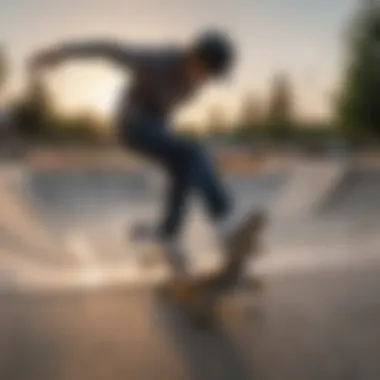Master the Art of Skateboarding: A Comprehensive Beginner's Guide


Equipment and Gear
When delving into the realm of skateboarding, ensuring you have the right equipment and gear is paramount. From protective gear like helmets to gear for enhancing performance like skate shoes and decks, each piece plays a crucial role in your skateboarding journey. Top brands revered in the skateboarding community offer a variety of products tailored to different skill levels and preferences. Staying updated on maintenance techniques, product upgrades, and the latest advancements in equipment is essential to maximize your skateboarding experience.
Techniques and Training
Mastering the basics of skateboarding requires a deep dive into advanced skills and techniques. From perfecting your ollies to mastering kickflips and grinds, each maneuver demands precision and practice. Engaging in training exercises and routines designed to enhance your strength, agility, and endurance will undoubtedly push your skateboarding abilities to new heights. Seeking insights from professional athletes and trainers can provide invaluable tips and tricks to hone your skills and elevate your performance.
Safety and Risk Management
Amidst the thrill of skateboarding, understanding the importance of safety protocols and risk management is non-negotiable. Familiarize yourself with common risks and potential hazards associated with skateboarding to mitigate any unwanted incidents. Developing strategies for risk mitigation and cultivating emergency preparedness can ensure your skateboarding sessions are not only exhilarating but also safe.
Lifestyle and Community
Beyond the exhilarating flips and tricks, skateboarding offers a unique lifestyle and community. Embracing the culture of extreme sports entails striking a balance between your passion for skateboarding and maintaining a healthy lifestyle. Implementing strategies to safeguard your mental well-being while engaging in the adrenaline-fueled world of skateboarding is crucial for longevity and fulfillment in this dynamic sport. Explore the camaraderie and support within the skateboarding community, where individuals come together to celebrate their mutual love for the sport.
Introduction to Skateboarding Basics
Skateboarding basics serve as the cornerstone for beginners entering the dynamic realm of skateboarding. Understanding these foundational elements is crucial for developing fundamental skills and techniques essential for progression in the sport. This section explores the core principles that underpin successful skateboarding endeavors, guiding novice riders towards a solid grasp of the sport's essentials. By mastering these basics, beginners can establish a strong framework to build upon as they navigate the exhilarating world of skateboarding.
Understanding Skateboarding
Skateboarding's history provides an insightful lens through which to view the growth and evolution of this popular recreational activity. Delving into the origins of skateboarding unveils a tapestry of cultural influences that have shaped and defined the sport over the years. Additionally, examining the factors that have contributed to the widespread popularity of skateboarding illuminates its enduring appeal across various demographics and regions.
The History of Skateboarding
The rich history of skateboarding traces back to its humble beginnings as a pastime born out of surfing culture. Understanding the historical trajectory of skateboarding offers valuable context for appreciating its evolution into a global phenomenon. By exploring pivotal moments and developments in skateboarding's past, enthusiasts can gain a deeper appreciation for the sport's roots and the innovations that have propelled it forward.
The Popularity of Skateboarding
The surging popularity of skateboarding reflects its universal allure and relevance in contemporary society. Unpacking the reasons behind skateboarding's widespread acclaim sheds light on the various aspects that draw individuals towards this exhilarating pursuit. Whether through its artistic expression, physical challenges, or sense of community, skateboarding's popularity serves as a testament to its enduring appeal and cultural significance.
Benefits of Skateboarding
Embarking on a skateboarding journey offers a multitude of benefits that extend beyond physical exercise. From enhancing physical fitness to fostering mental well-being, skateboarding encompasses a holistic approach to personal development and fulfillment. This section explores the diverse advantages that engaging in skateboarding can yield, encompassing both tangible health benefits and emotional rewards.
Physical Health Benefits
Participating in skateboarding activities promotes a range of physical health benefits, including improved cardiovascular endurance, enhanced coordination, and strengthened muscles. Embracing the physical challenges of skateboarding can contribute to overall fitness and well-being, encouraging individuals to stay active and energized through dynamic movement and exercise.
Mental Well-being Benefits
In addition to its physical advantages, skateboarding offers valuable mental health benefits that can enhance overall quality of life. The mental stimulation and sense of achievement derived from mastering skateboarding techniques can boost confidence, self-esteem, and resilience. By nurturing mental well-being through skateboarding, enthusiasts can cultivate a positive mindset and a resilient attitude towards challenges.
Skateboarding Culture
At the heart of skateboarding lies a vibrant and multifaceted culture that celebrates individuality, creativity, and camaraderie. This section delves into the cultural dimensions of skateboarding, exploring the sense of community and the artistic expressions that define skateboarding's unique identity.
Community and Camaraderie


Skateboarding communities provide a supportive and inclusive environment where individuals can connect, collaborate, and share their passion for the sport. The sense of camaraderie that permeates skateboarding culture fosters lifelong friendships and collaborations, creating a tight-knit community united by a love for skateboarding.
Art and Expression in Skateboarding
Artistic expression plays a prominent role in skateboarding culture, with riders showcasing their creativity and individuality through their unique style and approach to riding. The fusion of art and sport in skateboarding allows for innovative forms of self-expression and exploration, elevating the sport beyond physical maneuvers to encompass a rich tapestry of creativity and visual aesthetics.
Essential Equipment for Skateboarding
When delving into the world of skateboarding, having the right equipment is paramount to ensure a safe and enjoyable experience. This section will discuss the intricacies of essential gear that every beginner skateboarder should consider. From selecting the appropriate skateboard to choosing the necessary safety gear, understanding the importance of each element is key to mastering the basics of skateboarding.
Choosing the Right Skateboard
Selecting the right skateboard involves considering various factors that impact your performance and comfort on the board. Key aspects to pay attention to include deck size and shape, truck width and tightness, as well as wheel hardness and size.
Deck Size and Shape
The deck size and shape of a skateboard significantly influence its stability and control while riding. Opting for a deck size that aligns with your preferences and body size can enhance your balance and maneuverability on the board. Different deck shapes serve different purposes, with some providing better stability for beginners while others are tailored for specific skating styles. Understanding the nuances of deck size and shape helps in making an informed decision that complements your skateboarding journey.
Truck Width and Tightness
Trucks play a vital role in the turning ability of your skateboard. The width and tightness of the trucks impact your board's responsiveness to your movements. Choosing the right truck width ensures that your skateboard aligns with your riding style and preferences, offering a smooth and controlled skating experience. Properly adjusted tightness levels provide stability while allowing for fluid turns and tricks, making it essential to find the ideal balance that suits your skill level.
Wheel Hardness and Size
Wheel hardness and size directly affect the board's grip, speed, and versatility across different terrains. Selecting the appropriate wheel hardness ensures optimal traction and shock absorption, enhancing your riding comfort and performance. Wheel size influences the board's overall height, affecting your center of gravity and balance while skating. Understanding the characteristics of wheel hardness and size helps in customizing your skateboard to match your skill level and skating goals.
Safety Gear
Prioritizing safety is paramount in skateboarding to prevent injuries and ensure a sustainable riding experience. This section will focus on the importance of wearing safety gear such as helmets, knee and elbow pads, and wrist guards to protect yourself while honing your skating skills.
Helmets
Helmets are a fundamental piece of safety equipment that safeguard your head from potential impacts and falls during skateboarding. Choosing a well-fitted helmet that meets safety standards is crucial in reducing the risk of head injuries. Helmets come in various styles and designs, catering to different preferences while providing essential protection for your most vital organ. Prioritizing helmet usage as part of your skateboarding gear is a non-negotiable element in ensuring your well-being and longevity in the sport.
Knee and Elbow Pads
Knee and elbow pads serve as vital protection for your joints, minimizing the risk of abrasions, cuts, and fractures while skateboarding. These protective gears offer cushioning and impact absorption, shielding your elbows and knees from potential harm during falls or mishaps. Selecting durable and well-padded knee and elbow pads enhances your confidence on the board, allowing you to push your limits while mitigating the impact of unexpected tumbles.
Wrist Guards
Wrist guards play a crucial role in shielding your wrists from sprains, fractures, and other injuries sustained from falls or collisions. Providing support and stability to your wrists, these guards reduce the risk of wrist-related injuries commonly experienced in skateboarding. Opting for wrist guards that offer a comfortable fit and robust protection enables you to focus on honing your skills without worrying about potential wrist damage. Integrating wrist guards into your safety gear ensemble enhances your overall protection and ensures a safe and enjoyable skateboarding experience.
Fundamental Skateboarding Techniques
Skateboarding Basics' article covers various fundamental techniques crucial for beginners to master and progress confidently in their skateboarding journey. These techniques serve as the building blocks for acquiring more advanced skills and developing a solid foundation in skateboarding. Understanding and mastering fundamental techniques is essential to ensure safety, improve performance, and enjoy the sport to the fullest.
Basic Riding Stance
Regular Stance


The regular stance in skateboarding refers to positioning the left foot at the front of the board for comfort and ease while pushing off and maintaining balance. This stance is popular among beginners due to its natural feel for those accustomed to a similar stance in everyday activities like walking or other sports. The regular stance offers stability and control, making it an optimal choice for beginners to start with. However, individuals should note that leaning on one side constantly might lead to muscle fatigue or imbalances.
Goofy Stance
On the other hand, the goofy stance involves placing the right foot at the front of the skateboard, positioning the rider in the opposite direction compared to the regular stance. This stance can feel awkward initially but offers benefits in terms of agility and versatility once mastered. Skateboarders opting for the goofy stance often find it advantageous in executing certain tricks or maneuvers more fluidly. Yet, beginners might face challenges adapting to this stance's unique posture and balance adjustments.
Pushing and Stopping
Pushing Techniques
Efficient pushing techniques are vital for propelling the skateboard forward with control and momentum. Proper pushing involves using the back foot to initiate pushes while maintaining balance with the front foot on the board. Beginners should focus on maintaining a steady rhythm to avoid wobbling or veering off course. Mastering different pushing techniques can enhance speed, efficiency, and overall performance on various terrains.
Foot Braking
Foot braking serves as a fundamental method for slowing down and halting skateboard movement by dragging the sole of one foot against the ground. This technique requires coordination and balance to apply optimal braking force without losing control. Practicing foot braking helps beginners feel more confident in managing speed and stopping safely, preventing sudden falls or collisions while cruising or performing tricks.
Turning and Carving
Kick Turns
Kick turns are essential for changing the skateboard's direction by pivoting on the back truck while lifting the front wheels off the ground. This technique allows skateboarders to navigate corners, avoid obstacles, and explore new lines during their ride. Developing proficient kick turns enhances agility, fluidity, and adaptability in various skateboarding environments, contributing to overall skill progression and enjoyment of the sport.
Carving Techniques
Carving involves making smooth, sweeping turns by shifting body weight and applying pressure on the edges of the skateboard. It helps maintain speed and control while cruising or traversing slopes, adding style and finesse to the rider's movements. Mastering carving techniques enhances balance, coordination, and stability, crucial for executing advanced maneuvers and tricks with precision and confidence.
Safety Precautions and Injury Prevention
In the realm of skateboarding essentials, the significance of Safety Precautions and Injury Prevention cannot be overstated. This section serves as a crucial component of the guide, emphasizing the paramount importance of ensuring the wellbeing and security of skateboarders. By meticulously delving into this topic, aspiring skateboarders can grasp the essential measures required to prevent injuries and promote safe skateboarding practices.
Warming Up and Stretching
Benefits of Warm-Up Exercises
Embarking on a skateboarding session without a proper warm-up can significantly increase the risk of injuries. Engaging in Warm-Up Exercises before hitting the skate park plays a pivotal role in preparing the body for physical activity, enhancing flexibility, and minimizing the chances of strains or sprains. This crucial aspect of skateboarding preparation is indispensable for novices and seasoned skateboarders alike, contributing to improved overall performance and injury prevention.
Stretching Routine
Stress on muscles and joints is ubiquitous in skateboarding, making a Stretching Routine a fundamental practice for mitigating potential injuries. Integrating stretching exercises into a pre-skateboarding routine aids in improving circulation, enhancing muscle elasticity, and reducing muscle tension. The Stretching Routine outlined in this guide focuses on specific muscle groups utilized in skateboarding maneuvers, ensuring that skateboarders are adequately prepared physically and mentally for their skateboarding endeavors.
Fall Techniques
Rolling Out of Falls
Navigating falls gracefully is a skill that every skateboarder must cultivate. Rolling Out of Falls is a technique aimed at dispersing impact forces across the body, minimizing the risk of serious injuries. Emphasizing the proper way to fall and roll can significantly decrease the likelihood of sustaining severe injuries while skateboarding. This section delves into the art of falling safely and rolling out of falls effectively, equipping skateboarders with the knowledge essential for mitigating injury risks.
Protecting Your Head
Protecting one's head is non-negotiable in skateboarding safety protocols. Head injuries can have severe consequences, underscoring the critical importance of wearing helmets during skateboarding sessions. A helmet acts as a shield against head trauma, safeguarding skateboarders from potential concussions or more serious head injuries. This segment accentuates the indispensable nature of head protection gear in ensuring the safety and well-being of skateboarders.


Common Skateboarding Injuries
Sprains and Strains
Sprains and strains are prevalent injuries in skateboarding, often resulting from sudden twists or overextension of muscles and ligaments. Understanding the nuances of these common injuries is vital for skateboarders to recognize symptoms, seek appropriate medical attention, and facilitate a speedy recovery. This section sheds light on the characteristics, causes, and recommended precautions related to sprains and strains in the context of skateboarding activities.
Fractures
Fractures, though more severe, are potential risks in skateboarding endeavors. Fractures can occur from high-impact falls or collisions, underscoring the importance of adhering to safety protocols and understanding proper skateboarding techniques. An in-depth comprehension of fractures, including types, symptoms, and initial response measures, is imperative for skateboarders to safeguard themselves against these more serious injuries. This segment elucidates the complexities surrounding fractures in skateboarding and emphasizes proactive strategies for injury prevention and management.
Practice Drills and Skill Building
In the realm of skateboarding, mastering the fundamental techniques involves diligent practice drills and skill-building exercises. These components are crucial in honing one's abilities and fostering a strong foundation for progression. Practice drills not only enhance muscle memory but also improve coordination and balance, essential skills for any skateboarder aiming to excel in this dynamic sport. Skill-building exercises help in refining movements, ensuring precision and control while maneuvering the skateboard. Taking the time to focus on these drills can significantly elevate a skater's performance and overall experience.
Balance and Coordination Exercises
Board Balance Drills
Board balance drills play a vital role in enhancing a skateboarder's stability and control on the board. By practicing these drills, individuals can improve their equilibrium, ensuring a more steady and balanced ride. The key characteristic of board balance drills lies in their ability to strengthen core muscles and improve proprioception, vital for executing advanced tricks and maneuvers. These drills are a popular choice in this guide due to their effectiveness in aiding beginners in establishing a solid balance foundation. While board balance drills may initially pose a challenge, their advantages in developing key balancing skills outweigh any temporary difficulties, making them a valuable addition to a skateboarder's training regimen.
Off-Board Balance Exercises
Off-board balance exercises concentrate on enhancing a skateboarder's balance off the board, which is equally essential for overall performance. These exercises target proprioception and strengthen muscles critical for maintaining stability both on and off the skateboard. The distinct feature of off-board balance exercises lies in their ability to improve coordination and body control, contributing to enhanced maneuvering skills. While off-board exercises may require a different approach compared to on-board drills, their benefits in fostering well-rounded balance and coordination are evident. Integrating these exercises into training routines can complement on-board drills, offering a comprehensive approach to enhancing balance and overall skateboarding abilities.
Basic Trick Training
Ollie
The ollie is a foundational skateboarding trick that serves as a building block for mastering more advanced maneuvers. This trick involves popping the skateboard deck, leveling it in the air, and landing back on the wheels. The ollie is a popular choice in this guide due to its significance in progressing to higher-level tricks and its versatility in various skateboarding disciplines. Its unique feature lies in its fundamental nature, laying the groundwork for aspiring skateboarders to understand the mechanics of aerial movements. While mastering the ollie may require practice and patience, its advantages in unlocking a wide range of trick possibilities make it a fundamental skill in the skateboarding realm.
Kickflip
The kickflip is a trick that adds flair and skill to a skateboarder's repertoire, involving a combination of flipping the board while airborne and landing back on it. This trick is favored in this guide for its dynamic nature and its contribution to expanding a skater's trick toolbox. The key characteristic of the kickflip is its emphasis on coordination and timing, essential for achieving successful rotations and landings. Its unique feature lies in the satisfaction of executing a complex aerial maneuver, pushing skateboarders to enhance their technical abilities. Despite requiring practice to perfect, the kickflip's advantages in diversifying trick capabilities make it a valuable addition to any skater's skill set.
Progression Tips
Setting Realistic Goals
Setting realistic goals is an integral part of a skateboarder's journey towards improvement and growth. By establishing achievable objectives, individuals can track their progress and maintain motivation throughout their training. The key characteristic of setting realistic goals is its influence on pushing skaters to strive for continuous development while celebrating small victories along the way. This practice is prominently featured in this guide for its effectiveness in encouraging perseverance and focus in skill enhancement. While setting goals may present challenges in balancing ambition and feasibility, its advantages in fostering a growth mindset and commitment to improvement are invaluable.
Consistent Practice
Consistent practice is the cornerstone of skill development in skateboarding, emphasizing the importance of regular training sessions to refine techniques and expand proficiency. By dedicating time to consistent practice, skateboarders can ingrain muscle memory, enhance muscle strength, and improve overall performance. The key characteristic of consistent practice revolves around discipline and commitment, essential for achieving mastery in trick execution and riding skills. Its unique feature lies in the gradual but significant progress visible through regular training sessions, underscoring the value of persistence and dedication. Despite requiring diligence and patience, consistent practice's advantages in skill refinement and progression are pivotal in a skateboarder's development.
Conclusion
In this comprehensive guide to mastering skateboarding basics for beginners, the Conclusion section serves as a pivotal point, encapsulating the core essence of embarking into the exhilarating realm of skateboarding. It consolidates all the essential techniques, safety precautions, gear essentials, and training drills discussed throughout the article, offering a conclusive wrap-up to equip aspiring skateboarders with a solid foundation to kickstart their skateboarding journey.
Embarking on Your Skateboarding Journey
Embracing the Learning Process
Delving into the specifics of 'Embracing the Learning Process' in the context of mastering skateboarding basics, this aspect emphasizes the significance of embracing the inherent learning curves and challenges associated with starting a new endeavor. It highlights the resilience required to push through initial struggles and honing one's skills gradually. This approach advocates for patience, perseverance, and a growth mindset as fundamental elements to navigate the learning process effectively in this skill-intensive sport. Embracing the Learning Process delivers a valuable lesson on the journey to mastery, encouraging individuals to embrace failures as stepping stones towards improvement and excellence.
Continuing to Challenge Yourself
Addressing the aspect of 'Continuing to Challenge Yourself', this component underscores the importance of constant growth and pushing one's boundaries in the pursuit of mastering skateboarding basics. It advocates for a proactive approach towards skill development, encouraging individuals to set higher benchmarks, seek new challenges, and consistently strive for improvement. By embracing a mindset of continuous self-challenge, skateboarders can transcend their current capabilities, break through plateaus, and unlock their full potential in skateboarding. This relentless pursuit of self-improvement not only enhances skill proficiency but also fosters a deep sense of accomplishment and satisfaction, making the skateboarding journey an enriching and fulfilling experience.















